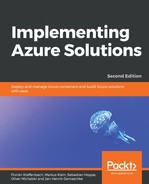There are a number of text conventions used throughout this book.
CodeInText: Indicates code words in text, database table names, folder names, filenames, file extensions, pathnames, dummy URLs, user input, and Twitter handles. Here is an example: "Not all resource types support the export template function."
A block of code is set as follows:
"parameters": {
"storageAccountName": {
"type": "string",
"metadata": {
"description": "Storage Account Name"
}
}
}
When we wish to draw your attention to a particular part of a code block, the relevant lines or items are set in bold:
{
"$schema": "https://schema.management.azure.com/schemas/2015-01-01/deploymentTemplate.json#",
"contentVersion": "1.0.0.0",
"parameters": {
"storageAccountName": {
"type": "string",
"metadata": {
"description": "Storage Account Name"
}
}
},
Any command-line input or output is written as follows:
New-AzureRmStorageKey -ResourceGroupName "MyResourceGroup" -AccountName "MyStorageAccount" -KeyName "key1"
Bold: Indicates a new term, an important word, or words that you see onscreen. For example, words in menus or dialog boxes appear in the text like this. Here is an example: "Browsing through the File Shares section, the earlier-created file share can be found."
